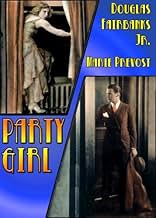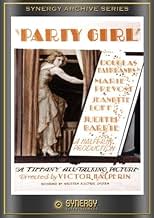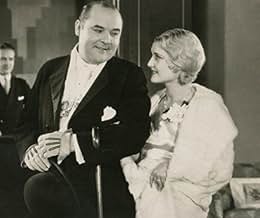A cautionary tale. Ellen's past as a "party girl" is carefully hidden but may be exposed when another party girl tricks her fiance into marriage.A cautionary tale. Ellen's past as a "party girl" is carefully hidden but may be exposed when another party girl tricks her fiance into marriage.A cautionary tale. Ellen's past as a "party girl" is carefully hidden but may be exposed when another party girl tricks her fiance into marriage.
Earl Burtnett
- Orchestra Leader
- (as Earl Burtnett and His Biltmore Orchestra and Trio)
Eddie Bush
- Member of Biltmore Trio - Guitar
- (uncredited)
Louise Carver
- Masseuse
- (uncredited)
Henry Roquemore
- Party Guest
- (uncredited)
Featured reviews
Dear Me! What a creaky talkie social shocker! Made really in 1929 with absolutely the most primitive sound recording, PARTY GIRL has all those Singin In The Rain sound recording problems (and solutions) evident: like the mic in the vase of flowers or on someone's shoulder or in a lampshade. Often one only one actor in a scene can be heard, or they turn their head out of range etc...all very funny etc. BUT this is otherwise a well staged sex expose made by the never heard of PERSONALITY PICTURES who really sound like a chorus girl racket itself. The film itself is a social morality play about a chorus girl racket and their high rise bed hopping antics ruining young mens lives and contorting business contracts from rightful owners. It also has all those great cliche scenes of tubby old fellers in tuxedos manhandling squealing 18 year old flappers at gin parties at the office. A good scene is a party in a wharehouse where guests actually drive into the goods lift and right up to the 11th floor and zoom directly into the room. Douglas Farbanks Jr is the handsome misled hero bedded by a floozie schemed by her conniving mother! The furniture and clothes alone are enough to watch this genuinely thoroughly modern 20s adult drama. I bought a dvd of this film for $5 in Sydney last week and the quality is quite good.
In those days when Douglas Fairbanks, Jr. was playing any kind of role other than costume swashbucklers, the better to establish his own identity separate from his father, Party Girl was a typical role for him. In Party Girl he plays a rich young playboy during that era of wonderful nonsense who gets himself tricked into a marriage to a gold digging flapper played by Judith Barrie. If Party Girl did anyone's career any good it should have been Barrie.
Almeeda Fowler plays the procurer for her escort service of which Barrie is part. Various businesses use her girls for 'entertainment' and the girls hope to land a rich husband one way or another.
Party Girl is one primitive talkie and it also bares no resemblance to Party Girl made a quarter of a century later with Robert Taylor and Cyd Charisse. Fairbanks is pretty insipid and that doesn't wear well on him.
Lots of pre-Code double entendre in Party Girl. But overall it hasn't worn well over the decades.
Almeeda Fowler plays the procurer for her escort service of which Barrie is part. Various businesses use her girls for 'entertainment' and the girls hope to land a rich husband one way or another.
Party Girl is one primitive talkie and it also bares no resemblance to Party Girl made a quarter of a century later with Robert Taylor and Cyd Charisse. Fairbanks is pretty insipid and that doesn't wear well on him.
Lots of pre-Code double entendre in Party Girl. But overall it hasn't worn well over the decades.
Wild Women! Bootleg hooch! Hot jazz! Sequins and furs! Blackmail! Suicide! This pre-Code cautionary tale opens with a typical disclaimer stating "It is our earnest hope that this film may arouse you..." Of course, they mean arouse your indignation to help eliminate such vices as you view in this exposé. Or, do they?
Pleasant juvenile Douglas Fairbanks, Jr., headlines along with a bevy of largely talent-free "party girls". Judith Barrie has some especially embarrassing scenes, leading one to wonder whether she may have gotten her part by being a party girl. Almeda Fowler, making her film debut as Maude "Don't call me Madam" Lindsay, and veteran actor John St. Polis put in decent performances adding some humor. The well regarded Earl Burtnett and His Hotel Biltmore Orchestra from Los Angeles provides suitable jazz accompaniment.
The best scene is the party where guests arrive in their automobiles via a service elevator directly to the party. The much commented upon perfumed fountain scene seems to have been excised from the version available from Alpha Video. Altogether, this is a pleasant diversion that pushes the envelope even for pre-Code Hollywood.
Pleasant juvenile Douglas Fairbanks, Jr., headlines along with a bevy of largely talent-free "party girls". Judith Barrie has some especially embarrassing scenes, leading one to wonder whether she may have gotten her part by being a party girl. Almeda Fowler, making her film debut as Maude "Don't call me Madam" Lindsay, and veteran actor John St. Polis put in decent performances adding some humor. The well regarded Earl Burtnett and His Hotel Biltmore Orchestra from Los Angeles provides suitable jazz accompaniment.
The best scene is the party where guests arrive in their automobiles via a service elevator directly to the party. The much commented upon perfumed fountain scene seems to have been excised from the version available from Alpha Video. Altogether, this is a pleasant diversion that pushes the envelope even for pre-Code Hollywood.
If you want to study good acting, this film is essential for, well, the flip side of the acting craft. The most basic line readings are spectacularly awful. My personal favorite: a woman, facing two policemen with overbearing warnings, saying, "so - long pause - what?" To be fair, though, the script, just the basic dialogue, is horrible and the plot is just the bare bones material for an audience to get a peek at a lurid world of 'party girls' and Prohibition-era 'gin parties.' The double-meanings are just a step more lurid than the thinly-veiled plots of other "A" pictures. While prostitution is the main theme, the look into how the rich flaunt the alcohol ban is sure to have titillated an audience of the era. The 'perfume' bath given to one of the girls is strongly suggested to be gin. And one cop notes before questioning a girl that the guilty go for a bottle before being interrogated. The class depictions in a film shot at the onset of the Depression also are stark. The rich drink and carouse with poor girls on the margins of society who, as the opening title says, want only to earn a living in a "decent" way. The message to women is clear enough: the workplace is no place for decent gals.
This lurid pre-coder is about the use of "party girls" in big business. The idea is that business men are wined and dined at wild parties where there are available girls.
Douglas Fairbanks, Jr. stars as a college boy who attends a party and is picked up by evil Leeda (Judith Barrie). Next morning she pretends she has been "wronged" and what's he gonna do about it? The sap marries her only to discover that she wants a business deal for her real boy friend in order to Fairbanks to divorce her. What a tramp! His dad's secretary (Jeanette Loff, who sings a couple songs), a reformed "party girl," is heartbroken and so returns to the party circuit only to get caught in a police raid.
This is a pretty racy film even for 1930. There's once scene where the girls fill a fountain with perfume and then the guys grab Marie Prevost (who does NOT get billing in this film for some reason), strip here and bathe her in the fountain while everyone watches.
The acting is just awful, with Fairbanks and Barrie turning in hideous performances, but the film is so suggestive and trampy, it's impossible not to watch.
John St. Polis the father, Almeda Fowler (don't call me madam!) is the madam, Louise Carver is the masseuse, and Lucien Prival is Newcast.
On the plus side, the music is quite good, and there that freight elevator that keeps delivering cars into the party living room!
Douglas Fairbanks, Jr. stars as a college boy who attends a party and is picked up by evil Leeda (Judith Barrie). Next morning she pretends she has been "wronged" and what's he gonna do about it? The sap marries her only to discover that she wants a business deal for her real boy friend in order to Fairbanks to divorce her. What a tramp! His dad's secretary (Jeanette Loff, who sings a couple songs), a reformed "party girl," is heartbroken and so returns to the party circuit only to get caught in a police raid.
This is a pretty racy film even for 1930. There's once scene where the girls fill a fountain with perfume and then the guys grab Marie Prevost (who does NOT get billing in this film for some reason), strip here and bathe her in the fountain while everyone watches.
The acting is just awful, with Fairbanks and Barrie turning in hideous performances, but the film is so suggestive and trampy, it's impossible not to watch.
John St. Polis the father, Almeda Fowler (don't call me madam!) is the madam, Louise Carver is the masseuse, and Lucien Prival is Newcast.
On the plus side, the music is quite good, and there that freight elevator that keeps delivering cars into the party living room!
Did you know
- TriviaThe film holds the record for longest UK film ban. The BBFC banned the film in 1930. It was finally released, with a PG rating, in 2003.
- Quotes
Diana Hoster: [answering phone from a massage table, butt-naked--literally; this is pre-code] Di Hoster speaking, in the flesh.
- ConnectionsFeatured in Hollywood Uncensored (1987)
- SoundtracksOh! How I Adore You
Words and Music by Harry Stoddard and Marcy Klauber
Copyright 1930 by Shapiro, Bernstein & Co
Details
- Release date
- Country of origin
- Language
- Also known as
- Dangerous Business
- Production company
- See more company credits at IMDbPro
- Runtime
- 1h 7m(67 min)
- Color
- Aspect ratio
- 1.37 : 1
Contribute to this page
Suggest an edit or add missing content




































